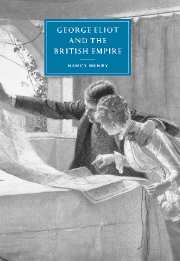Book contents
- Frontmatter
- Contents
- List of illustrations
- Acknowledgments
- List of abbreviations and note on the texts
- Introduction
- 1 Imperial knowledge: George Eliot, G. H. Lewes, and the literature of empire
- 2 “Colleagues in failure”: emigration and the Lewes boys
- 3 Investing in empire
- 4 Daniel Deronda, Impressions of Theophrastus Such, and the emergence of imperialism
- Conclusion
- Notes
- Bibliography
- Index
- CAMBRIDGE STUDIES IN NINETEENTH-CENTURY LITERATURE AND CULTURE
Introduction
Published online by Cambridge University Press: 22 September 2009
- Frontmatter
- Contents
- List of illustrations
- Acknowledgments
- List of abbreviations and note on the texts
- Introduction
- 1 Imperial knowledge: George Eliot, G. H. Lewes, and the literature of empire
- 2 “Colleagues in failure”: emigration and the Lewes boys
- 3 Investing in empire
- 4 Daniel Deronda, Impressions of Theophrastus Such, and the emergence of imperialism
- Conclusion
- Notes
- Bibliography
- Index
- CAMBRIDGE STUDIES IN NINETEENTH-CENTURY LITERATURE AND CULTURE
Summary
For learning to love any one is like an increase in property: it increases care, & brings many new fears lest precious things should come to harm.
George Eliot to the Hon. Mrs. Robert Lytton (GEL, 5:106)Upon his arrival in Cape Town on October 14, 1866, George Henry Lewes's youngest son wrote to his parents in London that he had visited the local library: “I saw the Fortnightly Review and all Mutters Books. They had also Felix Holt.” Herbert (Bertie) Lewes was waiting in Cape Town for a steamer that would transport him to Durban, where he would join his older brother Thornton (Thornie) and begin a new life. Bertie would never return to England and would die in 1875 – six years after the death of his brother – at the age of twenty-nine.
During their time in South Africa, the Lewes boys wrote dozens of letters to their father and George Eliot. Though Marian Evans had been living with Lewes since 1854, Lewes did not tell his sons about her or about his estrangement from their mother Agnes Lewes until 1859. They began to write to Miss Evans – who now called herself Mrs. Lewes – as “Mother” and to Agnes – who was still married to their father – as “Mamma.” Rosemarie Bodenheimer has written in detail about Marian Lewes's “struggle to answer to the demands of her stepmotherhood,” arguing that “to love Lewes perfectly was both to nurture his sons and to ensure at least Thornie's and Bertie's absence from the life of ‘dual egoism.’”
- Type
- Chapter
- Information
- George Eliot and the British Empire , pp. 1 - 14Publisher: Cambridge University PressPrint publication year: 2002



